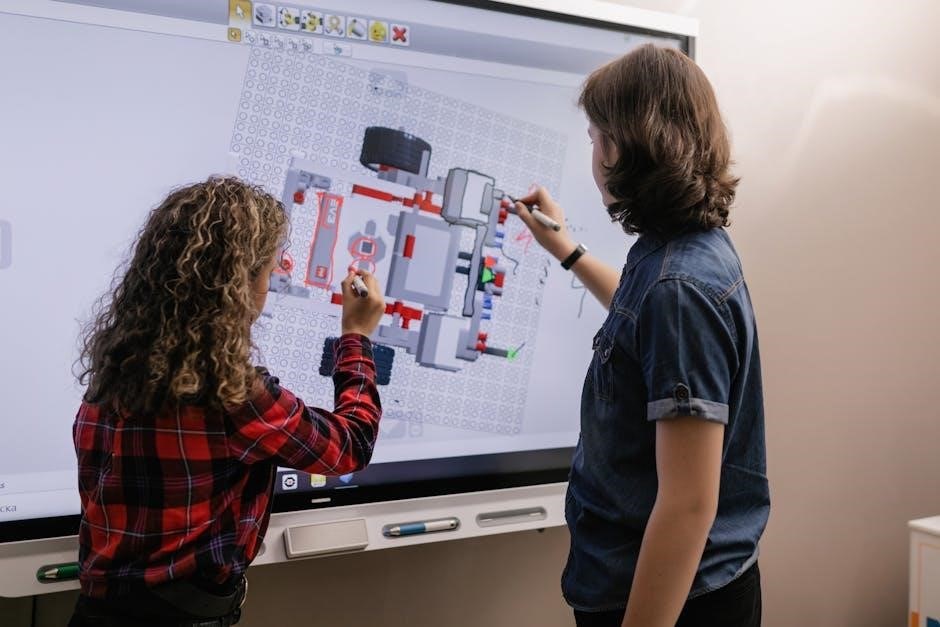
instructional aides
Instructional aides play vital role in education system, supporting teachers and students, providing individualized support and instruction, as paraprofessionals, under direction and supervision of teachers, daily.
Definition and Role
An instructional aide is a paraprofessional position performed under the direction and supervision of classroom teachers or other certificated personnel. They provide a variety of services in support of the instructional program, focusing on performing support-related tasks for a teacher or faculty member. The role of an instructional aide involves helping teachers maintain a safe and healthy learning environment, and assisting students who are having difficulties in a particular task or subject. Instructional aides work closely with teachers to provide individualized support and instruction to students, and are responsible for supporting the educational process. They are an essential part of the educational team, playing a vital role in ensuring that all students have access to a high-quality education. Their role is multifaceted, and they are responsible for supporting teachers, students, and the educational process as a whole, every day.
Responsibilities and Duties
Instructional aides play a crucial role in supporting the educational process, with responsibilities and duties that include assisting teachers with clerical and administrative tasks. They help with preparing teaching materials, creating visual aids, and recording attendance. Instructional aides also participate in the preparation of lesson plans and tests, and assist students who are having difficulties in a particular task or subject. Additionally, they help maintain a safe and healthy learning environment, and support students with special needs. Their duties may also include providing direct assistance to students, facilitating classroom activities, and helping to teach students. Overall, the responsibilities and duties of instructional aides are diverse and multifaceted, requiring a range of skills and abilities to support the educational process. They work closely with teachers to ensure that all students receive the support they need to succeed.

Importance of Instructional Aides
Instructional aides are essential for supporting students and teachers, enhancing education quality, daily, with their help, students achieve better academic results, overall, always.
Supporting Students
Instructional aides play a crucial role in supporting students, providing individualized attention and instruction to those who need it most, helping them to overcome challenges and achieve academic success. They assist students with disabilities, English language learners, and others who require extra support, helping to ensure that all students have access to a high-quality education. Instructional aides work closely with teachers to identify areas where students need additional support, and develop strategies to help them succeed. By providing one-on-one support and guidance, instructional aides help students to build confidence, develop skills, and achieve their full potential. This support is essential for helping students to succeed, and instructional aides are an integral part of the education team, working together with teachers and other staff to provide a supportive and inclusive learning environment for all students, every day, in every way, with great care and dedication always.
Assisting Teachers
Instructional aides provide valuable support to teachers, helping to alleviate their workload and allowing them to focus on instructional tasks. They assist with clerical and administrative duties, such as preparing teaching materials, recording attendance, and grading assignments. Instructional aides also help to maintain a safe and healthy learning environment, ensuring that classrooms are well-organized and equipped with necessary resources. By taking on these tasks, instructional aides enable teachers to devote more time to lesson planning, instruction, and assessment, ultimately enhancing the quality of education provided to students. Additionally, instructional aides often serve as a liaison between teachers and students, helping to facilitate communication and resolve issues that may arise, and supporting teachers in their efforts to provide a high-quality education to all students, every day, with great care and dedication, in a supportive and collaborative manner always.

Qualifications and Requirements
Instructional aides typically require high school diploma, on-the-job training, and sometimes college degree, with coursework in child development, daily, in educational settings, with students.
Education and Training
Instructional aides typically require a high school diploma or equivalent, and many have completed some college coursework or have an associate’s or bachelor’s degree. They may also receive on-the-job training, which can include orientation and mentoring programs. Some instructional aides may choose to specialize in a particular area, such as special education or English language learner support, and may receive additional training or certification in that area. Instructional aides may also be required to complete continuing education courses or professional development workshops to stay current on best practices and instructional strategies. This education and training helps instructional aides to provide high-quality support to teachers and students, and to make a positive impact on student learning and achievement. They work in educational settings, with students, and under the direction of teachers, daily.
Skills and Abilities

Instructional aides possess a range of skills and abilities that enable them to effectively support teachers and students. They have strong communication and interpersonal skills, which allow them to work collaboratively with teachers, students, and other school staff. Instructional aides are also organized and able to multitask, as they often have to prepare materials, assist with lesson plans, and provide individualized support to students. They are patient, flexible, and able to adapt to changing situations and priorities. Additionally, instructional aides have strong problem-solving skills and are able to think critically and creatively. They are also able to maintain confidentiality and handle sensitive information with discretion. These skills and abilities enable instructional aides to provide high-quality support and make a positive impact on student learning and achievement in educational settings. They work with students and teachers daily, providing essential support.

Instructional Aide Specializations
Instructional aides specialize in various areas, including special education, language support, daily living skills, and academic subjects, to support students’ diverse needs effectively.
Supporting Students with Disabilities
Instructional aides play a crucial role in supporting students with disabilities, providing individualized assistance and accommodations to ensure equal access to education. They work closely with teachers to develop and implement personalized learning plans, adapting instructional materials and strategies to meet the unique needs of each student. By providing emotional support, behavioral guidance, and academic assistance, instructional aides help students with disabilities to build confidence, develop social skills, and achieve academic success. Additionally, they assist with daily living skills, such as feeding, toileting, and mobility, enabling students to participate fully in classroom activities and interact with their peers. Overall, instructional aides make a significant difference in the lives of students with disabilities, empowering them to reach their full potential and become independent learners; Their support and dedication are essential to creating an inclusive and supportive learning environment.
Assisting English Language Learners
Instructional aides provide vital support to English language learners, helping them to overcome language barriers and succeed academically. They assist with language development, providing individualized instruction and practice in speaking, listening, reading, and writing. Aides also help students to understand and complete assignments, and provide clarification on vocabulary and concepts. By offering one-on-one support and small group instruction, instructional aides enable English language learners to build confidence and fluency in their new language. Additionally, they help to facilitate communication between students and teachers, ensuring that learners receive the support they need to thrive in the classroom. Overall, instructional aides play a critical role in helping English language learners to access the curriculum and achieve their full potential, making a significant difference in their educational journey and future success; They are essential to creating a supportive and inclusive learning environment.
Instructional aides are essential to education, providing support and enhancing student learning experiences daily with their help and guidance always.
Instructional aides play a crucial role in the educational system, providing support to teachers and students alike. They work under the direction and supervision of certified personnel, performing various tasks to enhance the learning experience. Their role involves assisting with lesson plans, preparing materials, and helping students with difficulties. Instructional aides also contribute to maintaining a safe and healthy learning environment, which is essential for student success. By providing individualized support, they help ensure that all students have access to a high-quality education. Overall, the instructional aide role is multifaceted, requiring a range of skills and abilities to effectively support teaching professionals and students. Their contributions are vital to the educational process, and their impact is felt throughout the academic community, making them an indispensable part of the education system, every day, in many ways, always.
Future of Instructional Aides
The future of instructional aides looks promising, with a growing demand for their services in educational institutions. As the educational landscape continues to evolve, the role of instructional aides is likely to expand, incorporating new technologies and innovative teaching methods. They will be expected to adapt to changing student needs, providing personalized support and instruction to ensure academic success. The use of digital tools and online resources will become more prevalent, enabling instructional aides to enhance their support services and reach a wider range of students. With their unique blend of technical, interpersonal, and organizational skills, instructional aides will remain essential to the educational process, driving student achievement and facilitating teacher effectiveness, now and in the years to come, with ongoing training and development, always, in many ways, every day.